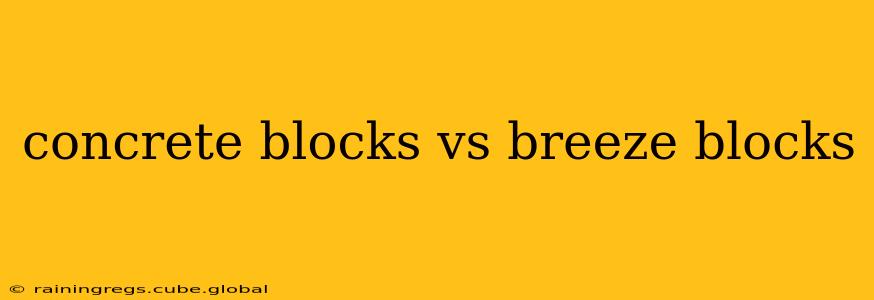Choosing between concrete blocks and breeze blocks can significantly impact your construction project, affecting cost, thermal performance, and structural integrity. This comprehensive guide explores the key differences, helping you make an informed decision.
What are Concrete Blocks?
Concrete blocks, also known as solid concrete masonry units (CMUs), are made from a mix of cement, aggregates (like sand and gravel), and water. They're solid, dense, and offer exceptional strength and durability. Their solid composition makes them ideal for load-bearing walls and foundations.
What are Breeze Blocks?
Breeze blocks, also called hollow concrete blocks or lightweight concrete blocks, are similar in manufacturing to concrete blocks but contain numerous holes or voids. These voids reduce the block's weight and density, leading to distinct advantages and disadvantages compared to solid concrete blocks.
Concrete Blocks vs. Breeze Blocks: A Detailed Comparison
Here's a breakdown of the key differences to help you decide which is best for your needs:
Strength and Durability:
- Concrete Blocks: Superior strength and durability. They can withstand significant loads and are highly resistant to damage. Ideal for structural applications.
- Breeze Blocks: Less strong than concrete blocks due to the voids. Suitable for non-load-bearing walls and partitions.
Thermal Performance:
- Concrete Blocks: Poor thermal insulation. They tend to absorb and retain heat, making them less energy-efficient in extreme climates.
- Breeze Blocks: Better thermal insulation than concrete blocks due to the air pockets within the blocks. This can lead to lower energy costs for heating and cooling.
Weight:
- Concrete Blocks: Heavier and denser, requiring more robust foundations and potentially increasing construction costs.
- Breeze Blocks: Lighter and easier to handle, reducing labor costs and potentially simplifying the construction process.
Cost:
- Concrete Blocks: Generally less expensive per block than breeze blocks. However, the higher weight and strength requirements might increase overall labor and foundation costs.
- Breeze Blocks: Can be more expensive per block but might offer cost savings in labor due to their lighter weight.
Sound Insulation:
- Concrete Blocks: Offer better sound insulation than breeze blocks due to their solid mass.
- Breeze Blocks: Provide less sound insulation compared to concrete blocks.
Aesthetic Appeal:
- Concrete Blocks: Often have a more industrial appearance. However, finishes like rendering or cladding can enhance their aesthetics.
- Breeze Blocks: Can offer a more modern or contemporary look, particularly with exposed block designs. The holes themselves can add textural interest.
Suitable Applications:
- Concrete Blocks: Foundations, load-bearing walls, retaining walls, and structures requiring high strength and durability.
- Breeze Blocks: Internal partition walls, external non-load-bearing walls, garden walls, and structures where thermal performance and lighter weight are prioritized.
What are the advantages and disadvantages of each?
This is a summary of the information above, presented in a question and answer format:
What are the advantages of concrete blocks?
Concrete blocks offer superior strength and durability, making them ideal for load-bearing structures. They are generally less expensive per unit.
What are the disadvantages of concrete blocks?
Concrete blocks have poor thermal insulation and are heavy, leading to higher labor and foundation costs.
What are the advantages of breeze blocks?
Breeze blocks offer better thermal insulation, reducing energy costs, and are lighter, simplifying handling and potentially reducing labor costs. They also offer a more versatile aesthetic.
What are the disadvantages of breeze blocks?
Breeze blocks are less strong and durable than concrete blocks and offer poorer sound insulation. They are generally more expensive per unit.
Which type of block should I choose?
The best choice depends entirely on your specific project requirements. Consider factors such as:
- Structural needs: Do you need a load-bearing wall or a non-load-bearing partition?
- Budget: What's your overall budget for materials and labor?
- Climate: Will the building be in a hot or cold climate?
- Aesthetic preferences: What look are you aiming for?
By carefully weighing these factors, you can select the block type that best suits your construction project. Consulting with a qualified builder or architect is always recommended for complex projects.
